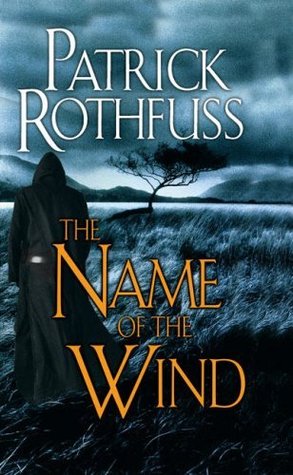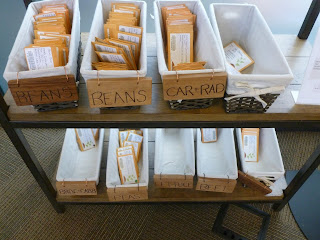There's nothing worse than a good story poorly told, unless it's a mostly good story mostly poorly told. I'm not sure which this book is, but either way it's bad news.
 |
| Image taken from www.goodreads.com |
I've seen Rothfuss and his work ballyhooed for some years now and was really looking forward to the chance to get into the first book of "The Kingkiller Chronicles." By all accounts, it seemed to be a genre-mover, an epochal work that moves the boundaries of fantasy forward while paying homage to the best of what came before. I was intrigued by the promise of a frame narrative, of a famous man mysteriously brought low, and of a creeping, misunderstood, demonic threat. There seemed to be echoes of my loves, "The Wheel of Time" and "A Song of Ice and Fire" in the promised themes of real-world events turning to legend and myth before our eyes and of the meaning made by stories determined by the skewed perspectives of the individuals through whose eyes the stories are experienced. It all sounds so good!
Sadly the book does not deliver. Or it only delivers up to a point, which makes it supremely frustrating rather than just bad.
First of all, Rothfuss' work needs to come with a trigger warning for grammar-lovers. Seriously, how did this book get past first draft like this? Who is this guy's editor? He or she should be canned immediately. Small but noticeable problems abound, the most frequent being an inconsistent and maddening lack of facility with the conventions of dialogue and tags. "'I think,' he said. 'That you are pretty.'"--that is NEVER RIGHT. (Okay, it's right if your character hesitates and makes the statement into two sentences. But if that's the case you should let us know that that is happening. And I know, Patrick Rothfuss, that you were just doing it wrong, because you did it 50-75% of the time.)
Sorry. I feel strongly that writers should know how to write.
The next big problem: the main character, Kvothe, is a baaaad example of whatever the male equivalent of a Mary Sue would be called. Let's say a Marvin Sue. (Oh, I guess some people say 'Gary Stu.' I like mine better.) The point is. Kvothe is perfect perfect perfect, he was better at everything as an 8 year old than you will ever be at your one passion in life at age 30, he runs rings around the authorities, and everything bad in his life is inflicted upon him by his enemies and/or his cruel destiny, boo-hoo for Kvothe, but wait, thanks to his daring and cunning, he always gets his way in the end! This human being is SO. DAMN. FRUSTRATING. And yes, he's charming, and occasionally shows some sensitivity, just enough to get you to want to follow his story and feel bad for him. But his entire personality is so much revenge porn for the downtrodden nerdlings of the real world, and, speaking as one of them, I feel like we deserve better than that kind of pandering in our fiction.
(To say nothing of Kvothe's supposedly rapier-sharp wit. Seriously, he talks like the picked-on kid in the schoolyard who hasn't yet come up with any better coping mechanisms. But Kvothe is rewarded with gales of laughter at every turn. Sigh.)
Then there's this authorial tendency throughout the text to seem tragically holier-than-thou compared to all that *snooty voice* run of the mill fantasy. We're constantly reminded how real life isn't like the stories and Kvothe has to work so much harder than the heroes of his world's folklore and mythology because god damn it there is no God or Narrator who's just going to hand us a win. Rothfuss makes such a point of it that it's obvious we're supposed to perceive Kvothe's story as this somehow rarefied, uber-realistic version of fantasy that, aside from magical metaphysics, abides by real-world laws of cause & effect and rationality and whatnot. At one point, he says something very much like, "I wasn't going to find their plans written out on an accidentally-discarded piece of paper!"
A few pages later, enter the convenient plot swineherd. He only travels this remote area once in a while, but he happens to be here at the same time as Our Hero, with not only the info Kvothe's looking for but also additional intelligence to propel the plot forward.
Look, I'm all for dissecting fantasy tropes and realism now and then. But don't preach about it and then substitute the deus ex machina you just had your character basically decry as lazy writing with another one that you hope your audience won't notice (or perhaps that you, yourself, did not notice).
The sanctimonious attitude gets old, and it extends to Kvothe's rhapsodizing about music, about how non-musicians just can't understand beauty and love and perfection. Oh, God's body, get over yourself, Patrick Rothfuss, you overgrown damaged adolescent.
And yeah, now I'm reading book 2. That's the most frustrating part. I almost feel as though Rothfuss structured his story as cynically as possible, knowing that no matter how disagreeable readers find the first volume, they will want the full story on all the hints and clues and intriguing bits seeded throughout. I feel manipulated, and I'm 7% in and grinding my teeth at the same old usage errors, but I'm not stopping.
And yet this book is as highly-rated as I've seen anywhere. I don't get it. I honestly don't. I'm usually fine letting people have their taste and enjoy their enjoyment ("I don't want to yuck your yum"), but this book violates the various laws and maxims and pet peeves that I've seen cited by numerous readers complain about OTHER books. (Poorly written--check. Mary Sue--check. Sanctimonious underpinnings--check. Manipulative--check.) And everyone is eating it up. I am saddened.
Maybe this will convince you to trash this book: Rothfuss writes "make do" as "make due." Twice.
*cheery smile* I hate what you've done to us, Patrick Rothfuss.









